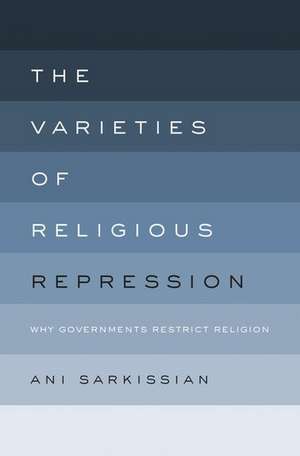The Varieties of Religious Repression: Why Governments Restrict Religion
Autor Ani Sarkissianen Limba Engleză Hardback – 5 mar 2015
Preț: 278.85 lei
Preț vechi: 328.35 lei
-15% Nou
Puncte Express: 418
Preț estimativ în valută:
53.36€ • 55.71$ • 44.06£
53.36€ • 55.71$ • 44.06£
Carte tipărită la comandă
Livrare economică 04-10 aprilie
Preluare comenzi: 021 569.72.76
Specificații
ISBN-13: 9780199348084
ISBN-10: 0199348081
Pagini: 260
Ilustrații: 3 black and white
Dimensiuni: 155 x 236 x 25 mm
Greutate: 0.5 kg
Editura: Oxford University Press
Colecția OUP USA
Locul publicării:New York, United States
ISBN-10: 0199348081
Pagini: 260
Ilustrații: 3 black and white
Dimensiuni: 155 x 236 x 25 mm
Greutate: 0.5 kg
Editura: Oxford University Press
Colecția OUP USA
Locul publicării:New York, United States
Recenzii
This work is to be commended for its rigorous conceptual development regarding the different strategies the state uses to repress religion, the depth and breadth of case studies, and grand theorizing in comparative politics.
Ani Sarkissian steers the scholarly discussion of religion and global politics toward what has been terra nullius authoritarian regimes. She charts out this terrain masterfully by identifying the wide variety of forms that religious repression can take and by supporting some bold empirical claims about when such repression will be most severe and how wide it is likely to extend. What she leaves us with is a map that, unlike most, depicts both broad contours and a wealth of interesting detail
The study of religion and politics has typically focused on interactions between church and state in a variety of democratic nations. Ani Sarkissian moves our understanding to a whole new dimension in her wide-ranging, but remarkably nuanced, study of religious repression in autocratic regimes. This book represents a theoretical and empirical tour de force that will not only be of interest to those studying religion, but scholars who are interested in the political dynamics of authoritarian regimes.
Ani Sarkissian draws on data from 101 countries to brilliantly tackle a vital question: How do politicians in non-democratic states use religious repression as an instrument of their rule and why? This book makes an important contribution to our understanding of the relationship between religious pluralism, democracy, and freedom of religious practice and expression.
Ani Sarkissian steers the scholarly discussion of religion and global politics toward what has been terra nullius authoritarian regimes. She charts out this terrain masterfully by identifying the wide variety of forms that religious repression can take and by supporting some bold empirical claims about when such repression will be most severe and how wide it is likely to extend. What she leaves us with is a map that, unlike most, depicts both broad contours and a wealth of interesting detail
The study of religion and politics has typically focused on interactions between church and state in a variety of democratic nations. Ani Sarkissian moves our understanding to a whole new dimension in her wide-ranging, but remarkably nuanced, study of religious repression in autocratic regimes. This book represents a theoretical and empirical tour de force that will not only be of interest to those studying religion, but scholars who are interested in the political dynamics of authoritarian regimes.
Ani Sarkissian draws on data from 101 countries to brilliantly tackle a vital question: How do politicians in non-democratic states use religious repression as an instrument of their rule and why? This book makes an important contribution to our understanding of the relationship between religious pluralism, democracy, and freedom of religious practice and expression.
Notă biografică
Ani Sarkissian is Associate Professor of Political Science at Michigan State University.













